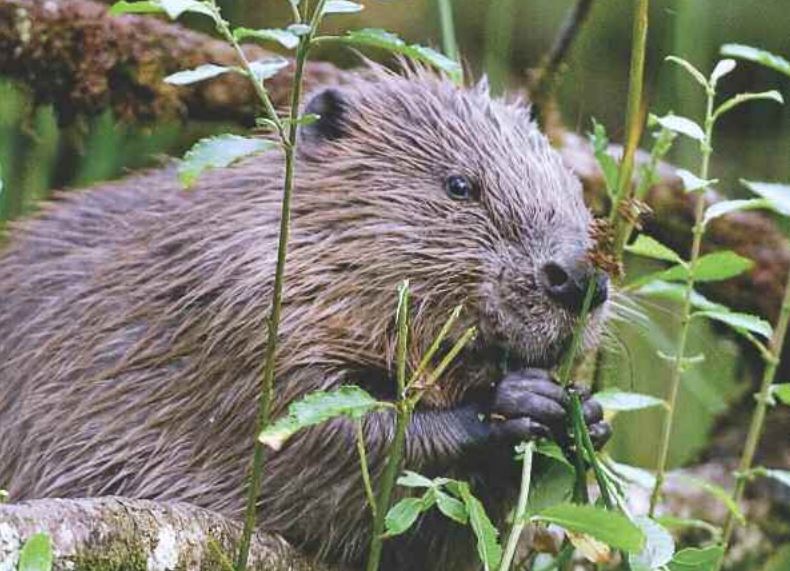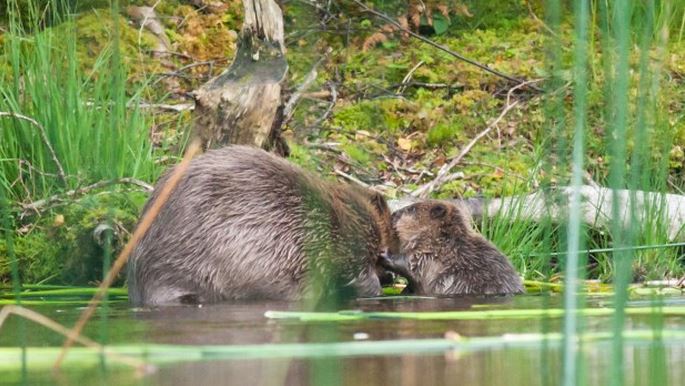Five healthy beavers have been re-released on to a Devon river, the Devon Wildlife Trust announced, expressing ‘delight and relief’. These are the only wild beavers in the England.
The beavers had been removed temporarily from the wild last month for testing for disease.
The five beavers were released on March 23rd in the evening at ‘a location on the River Otter,’ near Ottery St Mary in East Devon.
Devon Wildlife Trust’s Peter Burgess said from the scene:
“Today’s re-release means that these beavers are back where they belong, in the wild on the River Otter. We’re delighted and relieved that they’ve coped very well with a short period in captivity and been given a clean bill of health.”

The outlook for the Eurasian Beavers in Devon looks promising. (Image: The Devon Beaver Project)
“They’ve tested free of serious infectious diseases and we’re now looking forward to starting the next phase of our work: studying the long term effects of these wild beavers on the local landscape, on local communities and local wildlife.”
The Trust believes the beavers have been living on the River Otter for several years. They became national celebrities in February last year when film evidence showed the animals had kits (juveniles) with them.
Tom Buckley’s video footage (see below) proved that England had a population of thriving, breeding beavers, the first time this had occurred since they became extinct as a result of hunting many centuries ago.
Testing for disease
The Animal and Plant Health Agency caught five beavers, a juvenile and four adults, in February 2015. They were taken to a specialist veterinary facility in Devon where they were tested for several diseases.
The Natural England to Devon Wildlife Trust said it would grant the beavers a licence to remain on the River Otter for five years, as long as they were tested for diseases and given a clean bill of health.
Natural England’s Chairman, Andrew Sells, said:
“I am pleased that the beavers were found to be in good health. In accordance with its licence, Devon Wildlife Trust has supplied in-depth information on its monitoring programme and management strategy.”
“We are satisfied that the plans have formally met the licence conditions. This is an exciting time for conservation and I will take great interest in how the trial progresses.”

Wild beaver mother with her kit, proof that beavers are breeding in Devon.
Parliamentary Under-Secretary at the Department for Environment, Food and Rural Affairs, Lord de Mauley, said:
“I am pleased the beavers are disease free. They have now been returned to the river so that we can understand their effect on the environment better.”
“Natural England has worked closely with the Devon Wildlife Trust to ensure any reintroduction of the beavers was carefully considered and meets the strict licence conditions. I look forward to hearing how the five year trial progresses.”
A clean bill of health
During their short absence from their riverside habitat, the beavers underwent several health checks. Testing, carried out by beaver and leading veterinary experts from the Royal Zoological Society of Scotland, found they were free of a tapeworm known as Echinococcus multilocularis (EM) and bovine TB.
Roisin Campbell-Palmer, the Society’s Conservation Projects Manager, said:
“We were delighted to lend our expertise developed during our work with beavers in Scotland. As these beavers were of unknown origin it was important to establish that they were the correct species and in good health.”
“All individuals were Eurasian, in good body condition and free from parasites and diseases of concern. There is no evidence that beavers are failing to survive and adapt to English landscapes.”
River Otter Beaver Trial
The re-release of the healthy beavers marks the start of the River Otter Beaver Trial, a partnership project led by Devon Wildlife Trust, involving the University of Exeter and Derek Gow Consultancy.
The project will monitor the beavers over the next five years, and will measure their impact on the local wildlife, landscape, economy and communities.
The project will present Natural England with its evidence at its conclusion in 2020. A decision on the future of the beavers will be made using this information.
Clinton Devon Estates is one of the largest local landowners in the wild beaver’s territories. Dr. Sam Bridgewater, Nature Conservation Manager, said:
“We look forward to working as a key member of the reintroduction trial partnership over the coming years and building our understanding of the behaviour and impacts of this species on the River Otter.”
“An important part of the trial is to clarify how beavers are to be managed in the long term – a lesson learnt from similar introductions on the continent.”
In a summary of the challenges that lay ahead for the River Otter Beaver Trial, Chief Executive of the Devon Wildlife Trust, Harry Barton said:
“Our biggest challenge is now funding this work. The beavers have proved enormously popular with local people. An initial call for donations led to £50,000 being raised in just three months. However the cost of the five-year monitoring project will run into the hundreds of thousands of pounds.”
“Our message to supporters of the beavers is to donate what they can. By giving you’ll be part of a unique chapter in our nation’s natural history.”
Video – Young wild beavers in Devon
Video footage of beavers on the River Otter, east Devon, taken by Tom Buckley.

